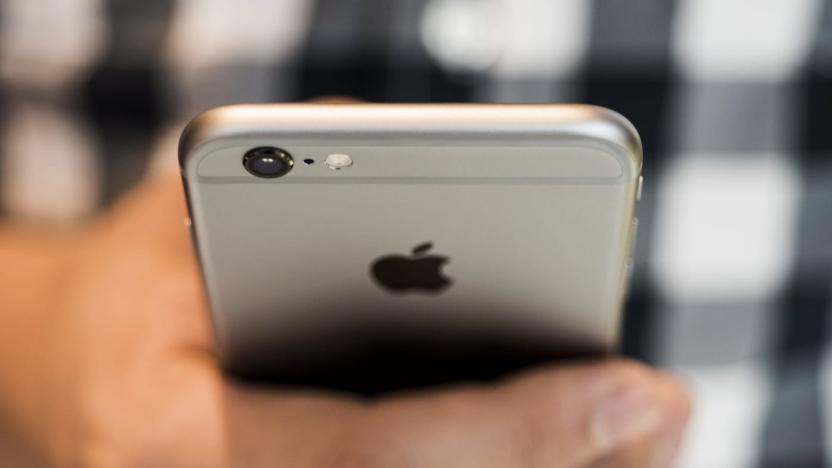CopyProtection
Latest

Spotify no longer streams music in Apple's Safari web browser
If you use Safari to stream Spotify tunes, you're going to need a plan B. Listeners have discovered that Spotify's web player no longer works with Safari. Visit and you'll be asked to either use an alternative browser or fire up the native Mac app. When asked about the abrupt change, the company's customer support could only say that "recent updates" made Safari incompatible. It can't say if or when the feature will come back. We've asked Spotify if it can elaborate, but there's already some speculation as to the possible cause.

Web gets built-in copy protection hooks with a few key flaws
Like it or not, the web is getting some built-in padlocks. The World Wide Web Consortium has decided to publish Encrypted Media Extensions, a standard for hooking copy protection into web-based streaming video, without making significant changes to a version agreed to in March. While it's not perfect, the W3C argues (you still need to deal with a vendor's content decryption module), it's purportedly better than the make-it-yourself approach media providers have to deal with right now. There do appear to be some improvements to the status quo for digital rights management. However, there are more than a few detractors -- there are concerns that the W3C simply ignored concerns in the name of expediency.

Netflix is no longer available for your rooted Android phone
Have you noticed that you suddenly can't (officially) download the Netflix app to your rooted Android phone? You're not alone. Netflix has confirmed that its app is no longer visible on Google Play to anyone with a device that is "not Google-certified or [has] been altered." A spokesperson tells Android Police that it's all about a shift in copy protection. Version 5.0 of the Netflix app now leans entirely on Google's Widevine digital rights management to prevent piracy, so it has to treat those modified devices as incompatible. The crackdown isn't completely shocking, but it does create some issues.

EA temporarily blocks Origin access in all of Myanmar
Some gamers are learning first-hand about the dangers of trusting your game library to a copy-protected service: you're at the mercy of that service and its interpretation of the law. Players living in Myanmar have discovered that EA started blocking access to Origin in the country sometime in September. Even if you started your account elsewhere, you aren't allowed to either visit the Origin store or use any of your purchased games. You can use a virtual private network to get around the restriction, but that could easily bog down your connection while playing online. Thankfully, the headache is only momentary.

Sega Saturn copy protection gets cracked two decades later
Sega Saturn fans have a problem: while the console has long supported unofficial code on CDs thanks to mod chips, that's no good if you want to use software in any other format. How will you play anything if your decades-old CD drive dies? You can rest easy after today. After years of work, enthusiast Dr. Abrasive has found a way to crack the Saturn's copy protection system and let it run software from a card with USB support. This was no mean feat, as it turns out -- the Saturn has a notoriously difficult-to-read anti-copying system that isolates itself from many cracking methods.

4K copy protection removal shop settles for $5.2 million
Intel and Warner Bros. are still very much embroiled in a war on companies stripping copyright protection from 4K and Blu-ray videos. Hardware seller Ace Deal has agreed to pay the two industry giants $5.2 million to settle a lawsuit over alleged violations of the Digital Millennium Copyright Act. Supposedly, Ace Deal knowingly aided in piracy by selling devices that remove HDCP anti-copying measures, making it relatively easy to bootleg the latest 4K movie extravaganza. The shop has already pulled the offending gear from its online store and is barred from selling similar devices in the future, but the small outfit still faces a relatively big, potentially crippling payout.

Oculus update stops you from using VR apps with HTC's Vive
HTC Vive and Oculus Rift owners generally have a lot in common, including access to many of the same apps and games. However, it looks like a gulf is opening up between the two virtual reality headsets. Oculus has released an app update whose improved "platform integrity checks" break support for Revive, an unofficial tool that lets Rift-specific apps (those in Oculus Home) run on HTC's gear. If you ask Revive's creators, they believe that Oculus is checking that its hardware is connected regardless of the app you're using -- previously, you only had to convince individual apps that there's a Rift attached.

iOS malware uses copy protection to infect 'pure' devices
Ne'er-do-wells have so far exploited holes in Apple's FairPlay copy protection primarily to distribute pirated iOS apps, but it now looks like they're turning their energy toward hurting users. Palo Alto Networks says it has discovered AceDeceiver, the first malware that uses FairPlay to infect its targets. Install a bogus iOS management utility for Windows (Aisi Helper) and the software will launch a man-in-the middle attack that grabs app authorization codes and uses those to install infected apps on any iOS device you connect to the system. Unlike many iOS attacks, this doesn't require that the target use a jailbroken device -- the apps are allowed to run as if they were completely legitimate.

Intel, Warner sue over device that strips 4K copy protection
The media industry was more than a little alarmed when 4K bootlegs of Amazon and Netflix streams showed up this November. Weren't these feeds supposed to be relatively safe from pirates? It's no surprise, then, that they're doing something about it. Intel (through its Digital Content Protection brand) and Warner Bros. are suing LegendSky for offering HDFury, a series of devices designed to strip HDCP copy protection from many sources, including streams. The two plaintiffs claim that HDFury violates the Digital Millennium Copyright Act's anti-circumvention measures, making it all too easy to rip and share 4K video. They also allege that LegendSky is dishonest when it says it meets HDCP's licensing requirements.

Sony's CD rootkit fiasco marks its inglorious 10th anniversary
Here's one product anniversary that Sony probably wants you to forget. It's the 10th anniversary of security researcher (now CTO for Microsoft Azure) Mark Russinovich publishing details of the Sony BMG rootkit, a CD copy protection system that compromised the security of Windows PCs and was near-impossible to safely uninstall. The music label was initially dismissive, but it soon had to change its tune -- it paid millions to settle charges and recalled legions of discs. To top things off, the discovery made Sony a punching bag for anyone unhappy with digital rights management (DRM) and other heavy-handed uses of copyright.

No thanks: JPEG images may soon have copy protection
So much for hopes that the tech industry would back away from copyright protection any time soon. The Joint Photographic Experts Group recently launched a Privacy & Security initiative that potentially brings digital rights management (DRM) to regular JPEG images, not just the specialized JPEG 2000 format. The proposal could protect your privacy by encrypting metadata (such as where you took a photo), but it could also prevent you from copying or opening some pictures. Needless to say, that opens up a can of worms when it comes to fair use rights. If someone slapped DRM on a photo, you couldn't use it for news, research or remixed art -- many of the internet memes you know wouldn't be possible.

Windows 10 won't run old games with dodgy copy protection
Do you recall the bad old days of PC games in the mid-2000s, when titles were loaded with copy protection that was not only a hassle, but horribly insecure? Well, Microsoft does -- and that could be a problem if you're trying to run some of those vintage games on Windows 10. The company notes that games which depend on some versions of SafeDisc and Securom DRM (digital rights management) aren't allowed to run on Windows 10 at all. That could mean that your dusty copy of Grand Theft Auto III, Battlefield 1942 or The Sims won't load. As Microsoft's Boris Schneider-Johne says, their DRM intrudes so deeply into your system that they introduce a "possible loophole for computer viruses." Sure enough, at least one of the concerns about burdensome copy protection proved true -- it was more of a nuisance to honest gamers than to pirates.

Matchstick delays its Firefox OS media stick to offer Netflix streaming
I hope you weren't in too much of a hurry to snag Matchstick's Firefox OS-based streaming media dongle. The fledgling company has delayed its namesake device to August in order to not only upgrade the hardware (to a quad-core processor and better WiFi), but to add support for anti-piracy protection. As the team explains, Netflix and other "premium" services won't work unless you have some kind of digital rights management (DRM) -- it's hard to sell a media stick that can't deliver the most popular content. The setback won't please you if you're an early backer (or see DRM as a blight on open standards), but it will make Matchstick's $25 device more useful to viewers who'd otherwise pick up a Chromecast to get their online video fix.

Keurig's coffee copy protection should take just months to crack
Much like printer makers barring cheap ink, Keurig is using elaborate methods to block third-party coffee pods; its upcoming Keurig 2.0 machine will have cameras that read tags and limit you to official brews. Think of it as K-cup copy protection. Unfortunately for the company, those added measures may be for naught. TreeHouse Foods, which sued Keurig for allegedly abusing a monopoly with its 2.0 system, now estimates that it should take just a "matter of months" to replicate the K-cup technology. The discovery should keep TreeHouse selling unofficial pods that cost significantly less than Keurig's, and it could also thwart similar protection schemes in other companies' coffee makers.

Ubisoft's Uplay social gaming platform coming to PS4 and Xbox One
Ubisoft's Uplay has a mixed reputation; while it brings rewards and social elements to games, it's also known for its internet-based copy protection and occasional security risks. However much you like the service, it's sticking around -- Ubisoft has confirmed that Uplay is coming to both the PlayStation 4 and Xbox One. The "full scope" of the service's features will be available in the company's games for both platforms, including launch titles like Assassin's Creed 4 and Watch Dogs. Whether or not that includes copy protection isn't clear, however; there's no word of any DRM beyond what's built into the consoles. We've reached out to Ubisoft for clarification, and we'll let you know if it sheds more light on the subject.

MediaPortal posts new beta with new look and CableCARD, teases bigger sequel (video)
MediaPortal is a rare veteran spinoff of XBMC -- a testament to its fan base, but also a sign that it needs a fresh coat of paint. A new 1.3 beta might offer just what home theater PC users have been looking for to keep the front end relevant, at least in the short term. It carries a much more contemporary (and less Windows Media Center-like) skin with minor tweaks to the layout and overall interface. CableCARD support also makes its overdue appearance, although the lack of official CableLabs approval keeps the software from recognizing any copy-protected shows. Don't fret if those additions aren't enough, however -- we've been given a hint as to what the long-in-development MediaPortal 2 will offer through a pair of videos. The clips are largely top-level overviews, but they allude to mobile tie-ins, events, extensions, more skin support, video backgrounds and news. With an Autumn Build of MP2 available "right around the corner" for viewers, it might not be long before we learn what those new additions are like through first-hand experience.

Ubisoft UPlay may accidentally contain web plugin exploit, Ezio would not approve (update: fixed)
If you've played Assassin's Creed 2 (or other Ubisoft games), you may have installed more stealthy infiltration than you bargained for. Some snooping by Tavis Ormandy around Ubisoft's UPlay looks to have have discovered that the service's browser plugin, meant to launch locally-stored games from the web, doesn't have a filter for what websites can use it -- in other words, it may well be open season for any maliciously-coded page that wants direct access to the computer. Closing the purported, accidental backdoor exploit is thankfully as easy as disabling the plugin, but it could be another knock against the internet integration from a company that doesn't have a great reputation for online security with its copy protection system. We've reached out to Ubisoft to confirm the flaw and learn what the solution may be, if it's needed. For now, we'd definitely turn that plugin off and continue the adventures of Ezio Auditore da Firenze through a desktop shortcut instead. Update: That was fast. As caught by Geek.com, the 2.0.4 update to UPlay limits the plugin to opening UPlay itself. Unless a would-be hacker can find a way to compromise the system just before you launch into Rayman Origins, it should be safe to play.

Elgato announces Game Capture HD, shows off your deathmatch prowess in H.264
Elgato is releasing the Game Capture HD, a device that lets game-casters and YouTube walkthrough mavens shed low-resolution, over-the-shoulder smartphone footage once and for all. The sleek black box sits between console and display, enabling gamers to record their speed runs and kill records for the world to see. Xbox 360 users can daisy-chain the gear into their HDMI set-up, while PS3 users will have to use the bundled AV cable to circumvent Sony's stronger copy protection. The footage will then be compressed with the company's H.264 know-how and pushed to your PC or Mac for uploading. When it arrives at the start of June, it'll set you back $200 -- just giving you enough time to get practicing your soothing and confident narration voice.

iPod owners notified of RealNetworks-related lawsuit's class action status, given chance to cash in (updated: not Real)
Remember the 2005 lawsuit over Apple's effort to keep RealNetworks' Harmony DRM off of the iPod, calling the countermeasures an abuse that locked customers into Apple's FairPlay copy protection and the iTunes Store? You're forgiven if you don't -- the complaint was filed in 2005. Even with iTunes having gone primarily DRM-free over three years ago, though, owners of iPods bought between September 12th, 2006 and March 31st, 2009 are just now getting notices that they qualify for a slice of any damages if they register and Rhapsody's former owner the class action group wins in court. Of course, there's no guarantee that RealNetworks former Rhapsody users will win and get you music money to feed your iPod, iPod classic, iPod nano or iPod touch, but unless you're planning to sue Apple yourself, there's no penalty for a legitimate claim. Update: RealNetworks has chipped in to let us know that it's "not involved in any way" with the lawsuit, which is actually an independent complaint centered around the Rhapsody users themselves. RealNetworks hasn't embroiled itself in a legal fight with Apple to date.

Xbox 360 modders claim CPU hack, make it party like an N64 (video)
The security system built into the 360's motherboard has more layers than an onion, which is why previous hacks have generally focused on the optical drive instead. But a couple of circuit breakers named Gligli and Tiros claim to have finally freed up the console's CPU, allowing all 360 variants to boot homebrew software while also making them invulnerable to patches sent out by Microsoft. The video after the break purports to show the fruits of their labor, including an N64 emulator running on a version of Linux. It doesn't really prove anything, except perhaps the lengths these guys have gone to: they use various hardware tools to slow down the console's CPU and then confuse it with so-called 'glitch' pulses in an effort to make it forget its normal boot-up checks. Certainly not a trick for the average F-Zero X racer, particularly when speed-boosting around copy protection like this may be shady in the eyes of the law. (One more thing: don't be put off by the video's soundtrack -- starts out weird but gets better, baby.) [Thanks, Rodolfo]


